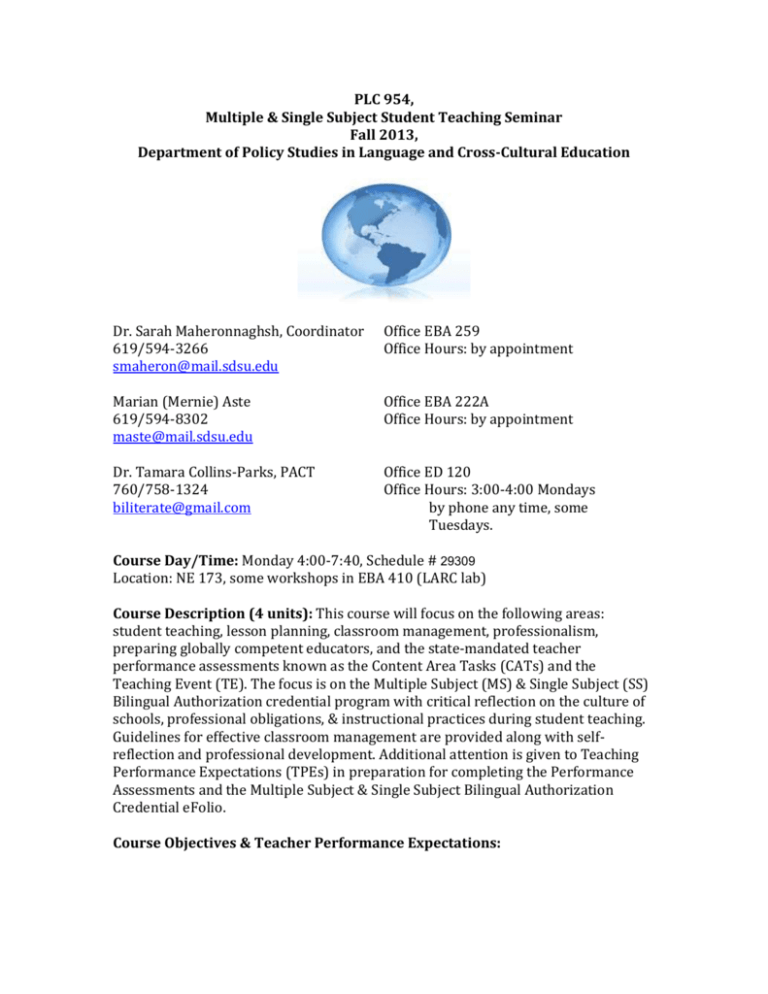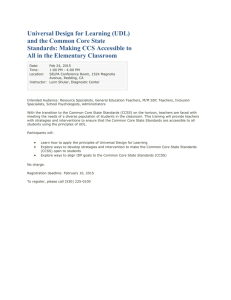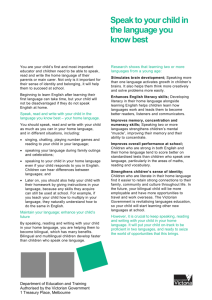View/Open
advertisement

PLC 954, Multiple & Single Subject Student Teaching Seminar Fall 2013, Department of Policy Studies in Language and Cross-Cultural Education Dr. Sarah Maheronnaghsh, Coordinator 619/594-3266 smaheron@mail.sdsu.edu Office EBA 259 Office Hours: by appointment Marian (Mernie) Aste 619/594-8302 maste@mail.sdsu.edu Office EBA 222A Office Hours: by appointment Dr. Tamara Collins-Parks, PACT 760/758-1324 biliterate@gmail.com Office ED 120 Office Hours: 3:00-4:00 Mondays by phone any time, some Tuesdays. Course Day/Time: Monday 4:00-7:40, Schedule # 29309 Location: NE 173, some workshops in EBA 410 (LARC lab) Course Description (4 units): This course will focus on the following areas: student teaching, lesson planning, classroom management, professionalism, preparing globally competent educators, and the state-mandated teacher performance assessments known as the Content Area Tasks (CATs) and the Teaching Event (TE). The focus is on the Multiple Subject (MS) & Single Subject (SS) Bilingual Authorization credential program with critical reflection on the culture of schools, professional obligations, & instructional practices during student teaching. Guidelines for effective classroom management are provided along with selfreflection and professional development. Additional attention is given to Teaching Performance Expectations (TPEs) in preparation for completing the Performance Assessments and the Multiple Subject & Single Subject Bilingual Authorization Credential eFolio. Course Objectives & Teacher Performance Expectations: 1. Identify the linguistic and academic needs of your diverse learners and ways to address these via written and spoken reflections, video clips of your teaching practices, lesson plans and course projects (various TPEs); 2. Identify and describe how to create a physical & social environment that engages all students in learning and uses instructional time effectively (TPE 5, 6, 7, 8, 11, 12 & 13). 3. Observe and articulate how teachers establish and maintain a climate that promotes fairness, equity, and respect while promoting social development and group responsibility (TPE 1, 5-8, 10, 11, 12, & 13). 4. Review, research & evaluate materials on effective teaching practices across gender, ethnicity race and handicapping conditions (TPE 5-8, 11 & 13). 5. Based on the CCSS and CA ELD 2012 Standards and the models of classroom management, articulate how to establish and maintain standards for student behavior (TPE 1, 5-8, 11-13). 6. Plan and implement classroom procedures and routines that support student learning and value student voice (TPE 1, 2, 5-9, 11 & 13). 7. Create a Discipline Philosophy that explores connections between school, families, parents, and local communities (TPE 8, 10 ,11, 16) Course Objectives related to the state mandated Teacher Performance Assessment 8. Find out about and describe your students and school program (TPE 8, Context for Learning). 9. Multiple Subjects: Candidates will excel on PACT-CAT context, planning and assessment tasks in Math, Science, and Social Studies while making connections to the PACT Teaching Event and applying insights about students and teaching to their own practice (TPEs 1, 3, 4, 7-9). Single Subject: Candidates will gain a working knowledge of the PACT Teaching Event, make connections with current coursework, and apply insights about students and teaching to their own practice (TPEs 1, 3, 4, 7-9). 10. Candidates will create, convert, post, and use videos to reflect on their own teaching practice (and prepare for Teaching Event video taping next semester). Texts/Materials Needed: Ruiz, M. Los Cuatro Acuerdos. Curwin, Mendler & Mendler. Discipline with Dignity: New Challenges, New Solutions. 3rd Edition. TaskStream Subscription -- purchase @ www.taskstream.com (about $40-50) Additional readings distributed in class and online via Blackboard class website Retrieve and print California Teacher Expectations from: http://www.ctc.ca.gov/educator-prep/standards/adopted-TPEs-2013.pdf CCSS: http://www.corestandards.org CA ELD 2012 Standards: (Make sure to print it in COLOR) http://www.cde.ca.gov/sp/el/er/eldstandards.asp Tech Usage: In the course of the class, candidates will make use of and evaluate various technologies: e.g., Blackboard, e-mail, on-line platforms such as TaskStream, databases, video recording (including conversion and posting), collaboration via comments on TaskStream, data director or other K-12 student records programs. Description of Assignments: Context for Learning (5 points): The more you know about your students, the better you will be able to teach them. You will complete a context for learning each semester. It provides (anonymous) background information on your school, classroom, curriculum, community, and students. The Context is shared across all Teacher Performance Assessment work completed in that semester. For example, even though MS bilingual candidates are completing two CATs in the Fall, candidates complete a single context for learning to be used across both Fall CATs. See BB and TaskStream for details and options. Lesson Plans: Collaboratively (10 points), course participants will prepare one 15-minute mini lesson to practice using the new PLC lesson plan template using the CCSS and CA ELD 2012 Standards. This lesson will be presented to the class. The instructor will model several lessons using the lesson plan template providing time for practice and reflection. Instructor will present models and further guidelines during the first weeks of class. Individually (10 points), course participants will prepare one 15-minute mini lesson to practice using the new PLC lesson plan template using the CCSS and CA ELD 2012 Standards. Instructor will present models and further guidelines during the first weeks of class. This lesson plan can be a lesson that has been assigned for the purpose of another methods course or be used for a methods course. Letter of Introduction to Parents: (10 points) Participants will write a letter introducing yourself to students’ families. Instructions and a rubric will be provided. Lead Morning Meeting Activity: (10 points) Each participant will lead a Morning Meeting Activity and provide a copy of how to implement the activity for each class member and the instructor. A model will be provided during the first class meeting. Please refer to 99 Activities & Greetings text (can borrow from instructor) . Classroom Management Share: (10 points) Participants will be responsible for sharing one classroom management strategy they have learned from the field that they have seen used or have implemented themselves. This should be simple and a strategy that your peers can implement the following day in the classroom. Instructor will model the second-class meeting. A sign-up sheet will be provided. Discipline Philosophy: (20 points) Participants will create a discipline philosophy that will be turned in at the end of the semester and will carry over into the Spring 2014 Seminar course. Further description and a rubric will be provided mid-semester. This will be a 1-2 page paper typed double spaced using APA style, to be turned in on Blackboard. Due 12/9/13. Preparing Globally Competent Educators (10): Students will be responsible for traveling to Tecate, Mexico on Saturday October 5th, 2013 and preparing a mini lesson to engage local students using the CCSS en ESPANOL. Participation/Attendance/Video/Course Readings (20 points): Attendance and participation are necessary elements to succeed in class and to accomplish your professional and educational goals in the program. Participation includes coming prepared to class having completed all assignments and readings (including video project – see BB for details). You will be allowed one absence during the session. After that absence, 5% will be deducted from your final course grade. In the case of ongoing medical needs, please consult instructors for special arrangements. It is your responsibility to get course notes and any information missed from a peer who is enrolled in the course. Cell phone usage and texting is prohibited during class unless the instructor is notified. If there is an emergency the instructor must be notified. Grading: 1. Context for Learning = 5 points 2. Lesson Plans 10 points each =20 points total 3. Letter of Introduction to Parents=10 points 4. Lead Morning Meeting Activity=10 points 5. Classroom Management Share=10 points 6. Discipline Philosophy=20 points 7. Preparing Globally Competent Educators in Tecate, Mexico =10 points 8. Participation/attendance/video/course readings=15 points Total points possible=100 Grade Equivalents (in points): 100-94= A 79-75=B93-90=A74-70=C+ 89-85=B+ 69-65=C 84-80=B 64-60=C- Tentative Course Calendar Class Date 8/26 Class Topics & Activities Writing Objectives Choosing CA Grade specific CCSS & CA ELD 2012 Standard to begin writing a lesson plan Model Classroom Management Strategy Letter to Parents/Families Assignments Due *Read appendix A of CA ELD Standards & B of CCSS 9/2 No Class Labor Day 9/6 Project CORE Symposium 9/9 *Discipline with Dignity: Chapter 1 Discipline *Letter to families due via Blackboard by Friday 9/6/2013 9/16 9/23 9/30 Phase 1 Lesson planning using CCSS & CA ELD 2012 Standards 12 Step Program for Discipline with Dignity Student teaching: discussion, how is it going? Problems, solutions Repeat Phase 1 with a peer alone using CCSS & CA ELD Standards 2012 Phase 2 Activity: D & D Examples of 12 steps, making a plan for yourself as an educator who disciplines with dignity *El Primer Acuerdo: Se Impecable Con Tus Palabras *Discpline with Dignity: Ch 1 *Bring CCSS & CA ELD 2012 Standards to class *In class reading “The Responsive Classroom” seven principles *Bring CCSS & CA ELD Standards 2012 to class! *El Primer Acuerdo: Se Impecable Con Tus Palabras Academic Language General & Language Demands D & D Chapter 2: Dignity and Responsibility in the Classroom *El Primer Acuerdo: Se Impecable Con Tus Palabras *D & D Chapter 2: Dignity and Responsibility in the Classroom *El Segundo Acuerdo: No Te Tomes Nada Personalmente *D & D Chapter 2: Dignity and Responsibility in the Classroom Assessment Guest Speaker: Alexandra Hunt, CCSS & CA ELD 2012 Standards & lesson planning D & D Chapter 2: Dignity and Responsibility in the Classroom 10/5 SATURDAY TRIP TO TECATE, MEXICO 10/7 Review all Projects for all Methods courses Bringing it all together creating a thematic lesson plan using CCSS & CA ELD 2012 Standards *Bring activity to engage local students with CCSS en ESPANOL *Presentations of Thematic Lesson plans created in small groups *El Segundo Acuerdo: No Te Tomes Nada Personalmente 10/14 - Workshop w/Tamara 10/18 10/21 10/28 - Workshop w/Tamara 11/4 11/11 11/18 11/20 11/25 - Workshop w/ Tamara 12/2 - Workshop w/ Tamara 12/5 12/6 12/9 Last Day of Class - Workshop w/ Tamara Overview of CATs and the Teaching Event. Project CORE Symposium The Three Key Dimensions of Disciplining with Dignity Your Philosophy of Discipline Assignment TaskStream Workshop in EBA 410 (LARC Lab) Guest Speakers: Teachers from the Field on Discipline/Classroom Management No Class Veteran’s Day Moving forward with Discipline Bilingual Math CAT due Wed Deep Questioning Strategies (monitoring & engagement) Video Workshop Video Conversion Workshop in EBA 410 (LARC Lab) Reflective Practice Groups Bilingual Social Studies CAT due Th Project CORE Symposium Semester reflection. Preparing for the TE next semester – steps & foci. *Presentations of lesson plans created in small groups *Tercer Acuerdo: No Hagas Suposiciones *Tercer Acuerdo: No Hagas Suposiciones *D & D Chapter 3: The Three Key Dimensions *D & D Chapter 3: The Three Key Dimensions **Tercer Acuerdo: No Hagas Suposiciones *D & D Chapter 4: The Social Contract *Cuarto Acuerdo: Haz Siempre Lo Maximo que Puedas *D & D Chapter 4: The Social Contract *Cuarto Acuerdo: Haz Siempre Lo Maximo que Puedas *Cuarto Acuerdo: Haz Siempre Lo Maximo que Puedas *El Camino Hacia La Libertad, El Cielo en La Tierra (Los Cuatro Acuerdos) *Due: Discipline Philosophy Paper Quick Facts on CATs for MS Bilingual Candidates CAT stands for “Content Area Task.” You use CATs to demonstrate key teaching skills within the core subject areas. CATs are part of the CTC Requirements for a Multiple Subjects Credential. Your methods teachers are key sources of information on the CATs but you have additional support via the PLC 954 Workshops. There are three CATs -- two for Fall and one for Spring concurrent with the Teaching Event (or TE). You will prepare one Context for Learning each semester to use across CATs and TE as appropriate. Context for Learning: The more you know about your students, the better you will be able to teach them. You will complete a context for learning each semester. It provides (anonymous) background information on your school, classroom, curriculum, community, and students. The Context is shared across all PACT related work completed in that semester. For example, even though MS bilingual are completing two CATs in the Fall, candidates complete a single context for learning to be used across both Fall CATs. Bilingual Social Studies CAT (in Spring): The Bilingual Social Studies CAT focuses on Planning, specifically planning social studies curriculum to be accessible to all students (PACT rubric 2), particularly those within a bilingual context. Products: context for learning (shared across CATs); lesson segment (series of lesson plans); all materials used; commentary explaining your rationale, strategies, etc. Due Thursday, 12/5/2013. Bilingual Science CAT (in Spring): The Science CAT also focuses on Planning, particularly the ability to plan lessons that build on each other to connect scientific concepts, real world phenomena, and scientific investigation/ experimentation skills (PACT rubric 1 for Science) within a bilingual context. Products: context for learning (shared across CATs); lesson segment (series of lesson plans); all materials used; commentary explaining your rationale, strategies, etc. Due Date TBD. Bilingual Math CAT (in Fall): The Math CAT focusses on Assessment, namely the ability to analyze and find patterns in bilingual and monolingual student performance that you can use to guide future instruction (PACT rubric 6). Products: context for learning (shared across CATs); assessment; criteria or rubric; student work samples; tables and commentary identifying patterns and analyzing results for class, subgroups and individuals, etc. Due Wednesday, 11/20/12.




